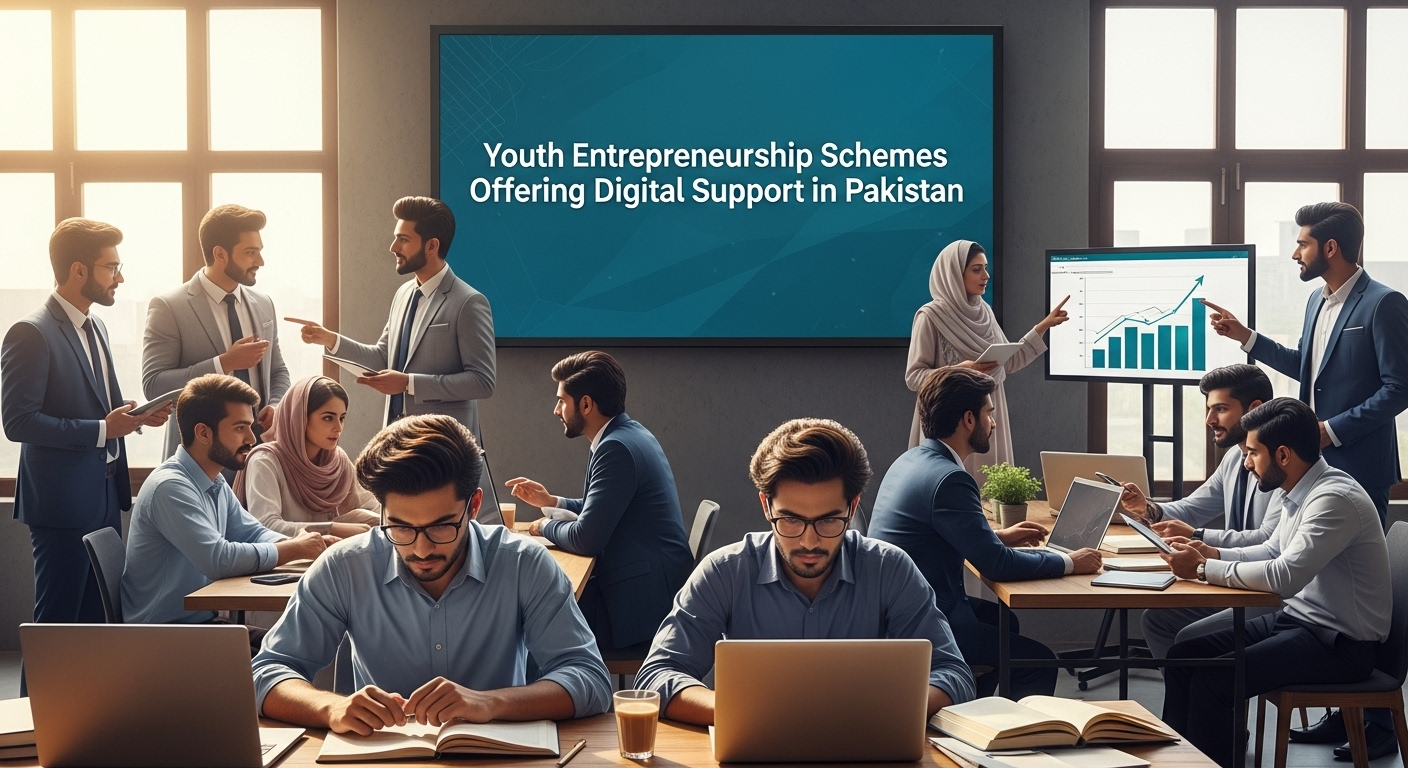In today’s fast-paced world, digital skills and online presence are no longer just an advantage—they are essential for any aspiring entrepreneur. For the youth of Pakistan, who make up a significant portion of the population, leveraging digital platforms can unlock immense opportunities for business growth and innovation. The good news is that both the government and various private organizations are actively working to provide robust digital support, training, and funding to young Pakistani entrepreneurs.
This comprehensive guide will walk you through the various schemes and initiatives available, explaining what they offer, why they are important, and how you can take advantage of them. Whether you’re an absolute beginner with just an idea or someone looking to scale an existing digital venture, this resource is designed to be your one-stop shop for navigating the entrepreneurial landscape in Pakistan with a digital edge.
Understanding the Digital Landscape for Entrepreneurs in Pakistan
Before diving into specific schemes, it’s crucial to understand why digital support is so vital for youth entrepreneurship in Pakistan. The digital economy is booming globally, and Pakistan is no exception. From e-commerce to freelancing, digital services, and tech startups, the online realm offers a lower barrier to entry, wider market reach, and often, more flexible operational models compared to traditional businesses.
Why Digital is Key for Pakistani Youth
The youth in Pakistan are naturally inclined towards technology. With increasing internet penetration and smartphone adoption, digital platforms become a natural extension of their daily lives. For entrepreneurs, this translates into several key advantages:
- Wider Market Reach: Your business isn’t limited to a physical location. You can sell products or services to customers across Pakistan and even internationally.
- Lower Overhead Costs: Setting up an online store or offering digital services often requires less capital than opening a brick-and-mortar shop, reducing initial investment risks.
- Flexibility and Scalability: Digital businesses can be operated from anywhere, offering flexibility. They can also be scaled up more easily by expanding online presence or diversifying digital offerings.
- Access to Information and Learning: The internet is a vast library of knowledge. Young entrepreneurs can access free or affordable online courses, tutorials, and mentorship to continuously learn and adapt.
- Global Opportunities: Many digital skills are globally recognized, allowing Pakistani youth to offer their services on international freelancing platforms or sell products to a global audience.
Step 1: Developing Your Digital Business Idea
Every successful venture starts with a clear idea. For digital entrepreneurship, this means thinking about what problem you can solve using technology or what value you can add through online platforms. Don’t rush this step; a well-thought-out idea is your foundation.
- Identify a Niche: Instead of trying to serve everyone, focus on a specific group or need. For example, instead of “selling clothes online,” think “selling modest fashion for young professional women in Lahore.”
- Problem-Solution Fit: Clearly define the problem your digital business will solve. If there’s no problem, there’s no need for your solution.
- Market Research: Use online tools to research keywords related to your idea, analyze competitor websites, and see what people are searching for. Talk to potential customers to understand their needs and preferences.
- SWOT Analysis: Evaluate your idea’s Strengths, Weaknesses, Opportunities, and Threats in the Pakistani digital market.
- Feasibility Study: Assess if your idea is practical to implement given your skills, resources, and the market conditions in Pakistan.
Common Mistake: Falling in love with an idea without validating its market demand. Always seek feedback from potential customers early on.
Step 2: Acquiring Essential Digital Skills
Having a brilliant idea is one thing; having the skills to execute it digitally is another. Pakistan offers numerous avenues for youth to gain the necessary digital expertise, often at little to no cost.
- Government Initiatives: Look into programs like DigiSkills.pk, an initiative by Ignite (National Technology Fund) under the Ministry of IT & Telecom. They offer free online courses in a wide range of digital skills, from freelancing and digital marketing to graphic design and e-commerce management. These courses are designed to be accessible and practical for Pakistani youth.
- Online Learning Platforms: Explore platforms that offer certified courses. Many provide free introductory modules or financial aid options.
- YouTube Tutorials and Blogs: A wealth of free information is available. Follow reputable channels and blogs to learn specific skills.
- Local Training Institutes: Many private institutes in major cities like Lahore, Karachi, and Islamabad offer specialized courses in digital marketing, web design, and e-commerce. Research their reputation and course content.
- Hands-On Practice: The best way to learn is by doing. Start a small personal project, create a mock website, or offer free services to friends or family to build your portfolio.
Tip: Don’t try to learn everything at once. Focus on the core skills needed to launch your minimum viable product (MVP) or initial service, and then gradually expand your skillset.
Step 3: Accessing Funding & Financial Support
Securing capital is often one of the biggest hurdles for young entrepreneurs. Fortunately, several schemes in Pakistan are specifically designed to provide financial assistance, including loans and grants, to help turn digital business ideas into reality.
- Prime Minister’s Youth Business & Agriculture Loan Scheme (PMYB&ALS): This is a flagship initiative by the Government of Pakistan. Formerly known as PMKJ-YES, it provides financial assistance to youth-led businesses.
- Eligibility: Pakistani citizens aged 21-45 (18 years for IT/E-Commerce related businesses).
- Loan Tiers: The scheme offers loans across three tiers with varying amounts and interest rates. Tier I for up to PKR 0.5 million (often interest-free for a period), Tier II for above PKR 0.5 million to PKR 1.5 million, and Tier III for above PKR 1.5 million to PKR 7.5 million.
- Application Process: Applications are typically submitted online through designated bank portals. You’ll need a well-prepared business plan, CNIC, educational/technical degrees, and details of any existing business or proposed venture. Banks like Allied Bank and Al Baraka Bank are often involved as executing agencies.
- Key Tip: For digital businesses, clearly articulate how the loan will be used for digital infrastructure, marketing, or tech development in your business plan.
- Small and Medium Enterprises Development Authority (SMEDA): While not a direct funding body, SMEDA offers comprehensive business planning resources, feasibility studies, and guidance that can strengthen your loan application. They also provide information on other funding opportunities.
- Ignite (National Technology Fund) Grants: Ignite sometimes offers grants for innovative tech-based startups and projects. Keep an eye on their announcements and specific calls for proposals, especially if your digital business involves cutting-edge technology.
- Angel Investors and Venture Capital (VC) Firms: For more ambitious tech startups, particularly those incubated at National Incubation Centers (NICs), angel investors and VC firms are a source of significant capital. This usually comes with equity in your company.
Common Mistake: Not having a solid business plan before applying for loans. Banks require a clear roadmap of how you’ll use the funds and generate revenue.
Step 4: Leveraging Incubation and Mentorship Programs
Beyond funding, a supportive ecosystem is invaluable for any startup. Incubation centers and mentorship programs provide the guidance, networking opportunities, and resources that can accelerate your digital business’s growth.
- National Incubation Centers (NICs): Established by Ignite and the Ministry of IT & Telecom, NICs are prime examples of public-private partnerships supporting startups. There are NICs in major cities like Islamabad, Lahore, Karachi, Peshawar, Quetta, Hyderabad, and Faisalabad.
- What they offer: Co-working spaces, high-speed internet, mentorship from industry experts, legal and financial guidance, networking events with investors, and access to a vibrant startup community.
- Application Process: NICs typically have application cycles. You’ll need to submit a detailed application outlining your business idea, team, and potential. Successful applicants go through an interview process before being selected for a cohort.
- Key Tip: Focus on clearly articulating your digital business’s innovative aspect and its potential for scalability in your application.
- University Incubation Centers: Many universities across Pakistan, such as LUMS, NUST, and NED, have their own incubation centers that support student and alumni startups.
- Private Accelerators and Incubators: Beyond government initiatives, several private organizations offer similar services, often with a sector-specific focus (e.g., fintech, e-commerce). Research reputable ones and their success stories.
- Networking Events: Attend startup expos, tech conferences, and workshops in your city. These are excellent opportunities to meet potential mentors, co-founders, and investors.
- Online Professional Networks: Platforms can help you connect with professionals in your industry who might be willing to offer advice or mentorship.
Common Challenge: Competition for limited spots in top incubation programs. Ensure your application stands out by highlighting innovation and team strength.
Step 5: Navigating Legal and Regulatory Requirements
Even for digital businesses, operating legally is paramount. Understanding the registration process, tax obligations, and other regulatory frameworks in Pakistan will save you from future complications.
- Business Structure: Decide on your business structure. For many young digital entrepreneurs, a Sole Proprietorship is the simplest to start. As you grow, you might consider registering as a Partnership or Private Limited Company (Pvt Ltd).
- Sole Proprietorship: Easy to set up; simply register for an NTN (National Tax Number) with FBR. You are personally liable for business debts.
- Partnership: Requires a partnership deed and registration with the Registrar of Firms.
- Private Limited Company: Offers limited liability, higher credibility, and easier funding. Registered with the Securities and Exchange Commission of Pakistan (SECP) via their eServices portal.
- National Tax Number (NTN) Registration: Every business, including a sole proprietorship, needs an NTN for tax purposes. You can apply for this through the FBR’s online portal (IRIS).
- Sales Tax Registration (STRN): If your digital business deals in goods or services that are subject to sales tax (e.g., selling physical products online), you will need to register for a Sales Tax Registration Number (STRN) with FBR.
- Business Bank Account: Once your business is registered (or you have your NTN), open a separate business bank account. This is crucial for separating personal and business finances and for tracking income and expenses.
- Local Licenses (if applicable): While many digital businesses don’t require physical shop licenses, some specific digital services might have unique local regulatory requirements. Consult with legal experts if unsure.
Common Mistake: Delaying legal registration or ignoring tax obligations. This can lead to significant fines and legal complications down the line.
Step 6: Building Your Digital Presence and Marketing
With your idea refined, skills acquired, and legalities handled, it’s time to build your online storefront and tell the world about your digital business.
- Website/E-commerce Store:
- Platform Choice: For e-commerce, platforms like Shopify, WooCommerce (for WordPress), or local Pakistani solutions are popular. For service-based businesses, a professional website using WordPress or a custom-built solution is ideal.
- Domain Name and Hosting: Choose a memorable domain name and reliable hosting provider. Many local providers offer good services.
- User Experience (UX): Ensure your website is user-friendly, mobile-responsive, and loads quickly. Pakistani internet speeds can vary, so optimize for efficiency.
- Social Media Marketing:
- Platform Selection: Identify where your target audience spends most of their time (e.g., Facebook, Instagram, TikTok for younger audiences; LinkedIn for B2B).
- Content Strategy: Create engaging content relevant to your audience. This could include product photos, informative videos, tutorials, or behind-the-scenes glimpses.
- Paid Advertising: Consider running targeted ads on Facebook, Instagram, or Google to reach a wider audience quickly. Start with a small budget and scale up as you see results.
- Search Engine Optimization (SEO):
- Keyword Research: Identify terms your potential customers are using to search for products or services like yours.
- On-Page SEO: Optimize your website content, titles, and descriptions with relevant keywords.
- Local SEO: If your business has a local component, optimize for local searches (e.g., “e-commerce solutions in Karachi”).
- Content Marketing: Create valuable blog posts, videos, or infographics that answer customer questions and establish you as an authority in your niche.
- Email Marketing: Build an email list and send newsletters, promotions, or updates to your subscribers.
Tip: Start small with one or two digital marketing channels, master them, and then expand. Don’t try to be everywhere at once, especially if you’re a one-person army.
Step 7: Managing Payments and Logistics Digitally
For any digital business, especially e-commerce, efficient payment gateways and reliable logistics are critical for a smooth customer experience in Pakistan.
- Payment Gateways:
- Local Options: Partner with local banks or payment service providers that offer online payment solutions (e.g., credit/debit card processing, bank transfers, JazzCash, EasyPaisa).
- Cash on Delivery (COD): This remains a popular payment method in Pakistan. Ensure your logistics partner can handle COD effectively.
- International Payments: If you plan to sell internationally, research global payment solutions that facilitate cross-border transactions.
- Logistics and Delivery:
- Courier Services: Partner with reputable courier companies operating across Pakistan (e.g., TCS, Leopards Courier, Call Courier, M&P). Negotiate rates based on your expected volume.
- Tracking: Ensure your customers can track their orders online. This builds transparency and trust.
- Returns and Exchanges: Develop a clear and customer-friendly policy for returns and exchanges.
- Inventory Management (for e-commerce): Use online tools or spreadsheet systems to keep track of your inventory to avoid overselling or stockouts.
Common Mistake: Underestimating the importance of reliable logistics. A delayed or lost delivery can severely damage your brand reputation.
Step 8: Continuously Learning and Adapting
The digital world is constantly evolving. What works today might not work tomorrow. Successful digital entrepreneurs are those who commit to lifelong learning and adapting their strategies.
- Follow Industry News: Subscribe to prominent tech and business news outlets, blogs, and podcasts that cover digital trends in Pakistan and globally.
- Attend Webinars and Online Workshops: Many experts offer free or paid online sessions on specific digital marketing, e-commerce, or tech topics.
- Analyze Data: Use analytics tools (like Google Analytics for your website, or built-in analytics on social media platforms) to understand your audience’s behavior, campaign performance, and sales trends.
- Seek Feedback: Actively solicit feedback from your customers. Their insights are invaluable for improving your products or services.
- Network: Stay connected with other entrepreneurs, especially those in the digital space. Share experiences and learn from each other’s successes and failures.
- Experiment: Don’t be afraid to try new marketing tactics, product features, or business models. Small, controlled experiments can yield significant insights.
Tip: Build a habit of dedicating a few hours each week to learning. Even short bursts of learning can make a big difference over time.
Conclusion
Youth entrepreneurship in Pakistan, especially with a digital focus, is a powerful force for economic growth and individual empowerment. The landscape is rich with opportunities, and crucially, it is supported by a growing ecosystem of government initiatives, private programs, and accessible learning resources.
While the journey of an entrepreneur is rarely without its challenges, by carefully developing your idea, acquiring essential digital skills, leveraging available funding and mentorship, understanding legal requirements, building a strong online presence, and committing to continuous learning, young Pakistanis can truly thrive in the digital economy. Embrace the digital revolution, take that leap of faith, and remember that with perseverance and the right support, your digital business dream can become a successful reality.
Resources
Government Schemes & Training Programs
Prime Minister’s Youth Business & Agriculture Loan Scheme (PMYB&ALS)
The State Bank of Pakistan provides details on eligibility, application procedures, and participating banks:
👉 SBP PMYB&ALS OverviewDigiSkills.pk
A government initiative offering free online digital skills training courses:
👉 DigiSkills Official PortalIgnite (National Technology Fund)
Supports innovation and entrepreneurship in Pakistan, including the DigiSkills program:
👉 Ignite Official WebsiteNational Incubation Centers (NICs)
Provides support to startups across various cities:Small and Medium Enterprises Development Authority (SMEDA)
Offers resources for business planning and development:
👉 SMEDA Official WebsiteFederal Board of Revenue (FBR)
For National Tax Number (NTN) registration and other tax-related services:
👉 FBR Registration PortalSecurities and Exchange Commission of Pakistan (SECP)
Provides information on company registration and related services:
👉 SECP Company Registration
Online Payment Gateways in Pakistan
JazzCash
A leading mobile wallet and payment service:
👉 JazzCash Official WebsiteEasyPaisa
Offers digital financial services across Pakistan:
👉 EasyPaisa Official Website
Courier Services in Pakistan
TCS
Provides domestic and international courier services:
👉 TCS Official WebsiteLeopards Courier
Offers logistics and courier solutions:
👉 Leopards Courier Official WebsiteCall Courier
Provides delivery and logistics services:
👉 Call Courier Official WebsiteM&P
Offers nationwide courier and logistics services:
👉 M&P Official Website










